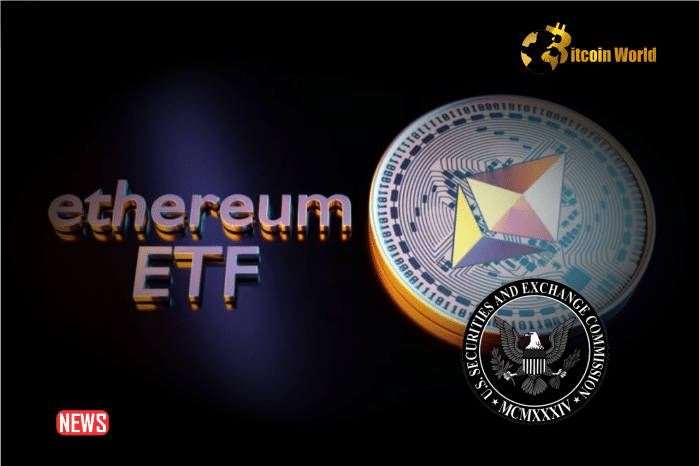The crypto world is holding its breath, waiting to see if the Securities and Exchange Commission (SEC) will greenlight a spot Ethereum exchange-traded fund (ETF) next month. But not everyone’s optimistic. JP Morgan analysts are throwing some cold water on the excitement, suggesting the chances of approval are looking slim. Let’s dive into why.
JP Morgan’s Doubts: What’s Behind the Uncertainty?
JP Morgan analysts have voiced their concerns about the SEC approving a spot Ethereum ETF in May. Their pessimism stems from the SEC’s recent actions, specifically investigations into firms connected to the Ethereum Foundation. While the SEC hasn’t confirmed these investigations, JP Morgan sees it as a sign that the regulatory environment isn’t favorable for an ETF approval.
- SEC Scrutiny: Increased investigation into Ethereum-related entities raises red flags.
- Low Probability: Analysts estimate a less than 50% chance of approval by May.
- Potential Legal Battles: If denied, applicants may challenge the SEC, potentially leading to eventual approval, but not immediately.
Why the SEC’s Hesitation?
The SEC’s caution likely stems from ongoing debates about whether Ethereum should be classified as a security or a commodity. This classification is crucial because it dictates how Ethereum-based investment products are regulated.
Security vs. Commodity: A Key Difference
The classification hinges on the level of decentralization. If Ethereum is deemed sufficiently decentralized, it might be classified as a commodity, making an ETF approval more likely. However, recent SEC actions suggest they may still view Ethereum with a degree of skepticism.
What Happens if the ETF is Denied?
If the SEC rejects the spot Ethereum ETF applications, legal challenges are expected. Analysts believe that, similar to previous cases involving Grayscale and Ripple, the SEC might eventually lose these battles, paving the way for future ETF approvals. However, this process could take considerable time.
Broader Market Sentiment
JP Morgan isn’t alone in its cautious outlook. Bloomberg Intelligence ETF analysts also believe that approval in the near term is unlikely. This widespread skepticism suggests that the market is bracing for a potential delay in the launch of a spot Ethereum ETF.
Looking Ahead: What’s Next for Ethereum ETFs?
Despite the current uncertainty, the long-term prospects for Ethereum ETFs remain positive. As Ethereum continues to mature and demonstrate its decentralization, the SEC’s concerns may gradually ease. The eventual approval of a spot Ethereum ETF could unlock significant investment and further legitimize Ethereum as a mainstream asset.
Key Takeaways:
- Short-term approval of a spot Ethereum ETF is uncertain.
- SEC’s concerns revolve around Ethereum’s classification as a security or commodity.
- Legal challenges are likely if the ETF is denied.
- Long-term prospects for Ethereum ETFs remain positive.
In conclusion, while the immediate future of spot Ethereum ETFs is clouded with uncertainty, the underlying potential of Ethereum and the persistence of ETF applicants suggest that approval is a matter of when, not if. Investors should stay informed and prepared for potential delays, while keeping an eye on the evolving regulatory landscape.
Disclaimer: The information provided is not trading advice. Bitcoinworld.co.in holds no liability for any investments made based on the information provided on this page. We strongly recommend independent research and/or consultation with a qualified professional before making any investment decisions.
#Binance #WRITE2EARN
Disclaimer: The information provided is not trading advice, Bitcoinworld.co.in holds no liability for any investments made based on the information provided on this page. We strongly recommend independent research and/or consultation with a qualified professional before making any investment decisions.



